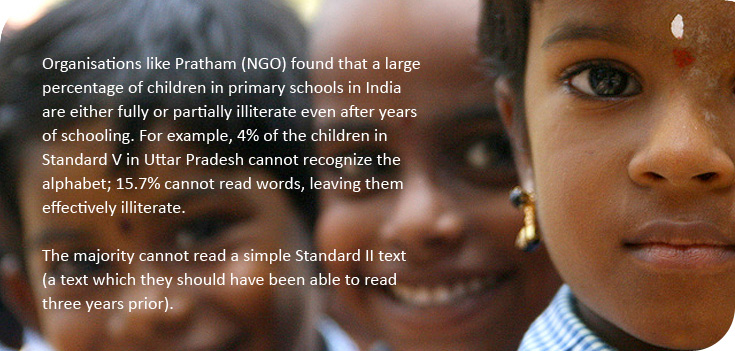Reason for Existence for Sankalp
“India’s formal education system is failing and government school system is failing — government is not delivering the goods”- Raghuram Rajan, economic advisor to Prime Minister, Government of India (Chicago, 17 Oct. 2011)

Research indicates that learning outcomes in government primary schools in India are well below acceptable standards. Moreover, the quality of students across different states is varied. Evaluations by the government and NGOs across several districts highlight alarming deficiencies in children’s learning per their stated grade level. The Annual Status of Education Report (ASER), conducted each year since 2005 in all rural districts of the country, shows that, only 53% of grade 5 students in rural India could read a grade 2 level texts and only 36% could solve a three digit by one digit division problem. This indicates that a vast proportion of grade 5 students lack the very basic skills expected of them. Nationally, this situation has hardly changed during last few years.
SANKALP EK PRAYAS identifies a wider domain here to work for quality education as it is believed that it would require massive mobilization on an unprecedented scale and seamless collaboration between the government, public, businesses and social organizations to ensure quality education for every eligible child. Universalization of education cannot be achieved unless there is intervention at community, household as well as school level and it is only NGOs which are equipped to work at all these levels.
According to a Goldman Sachs report — ‘India’s Rising Labor Force’ — around 100 million people from India are projected to join the global workforce by 2020. With 50% of its population below the age of 25 and more than 65% hovering below the age of 35, India seems to be poised to reap a demographic dividend.
If young Indians are to meaningfully participate in the economy and contribute to growth, they need a reformed system.
“It is imperative to ensure and improve the quality of education,” This makes the role SANKALP as a social non-profit organization even more significant as it seeks to supplement, complement or substitute the formal education system in the country and reach out to the excluded, underprivileged and challenged sections of society.


